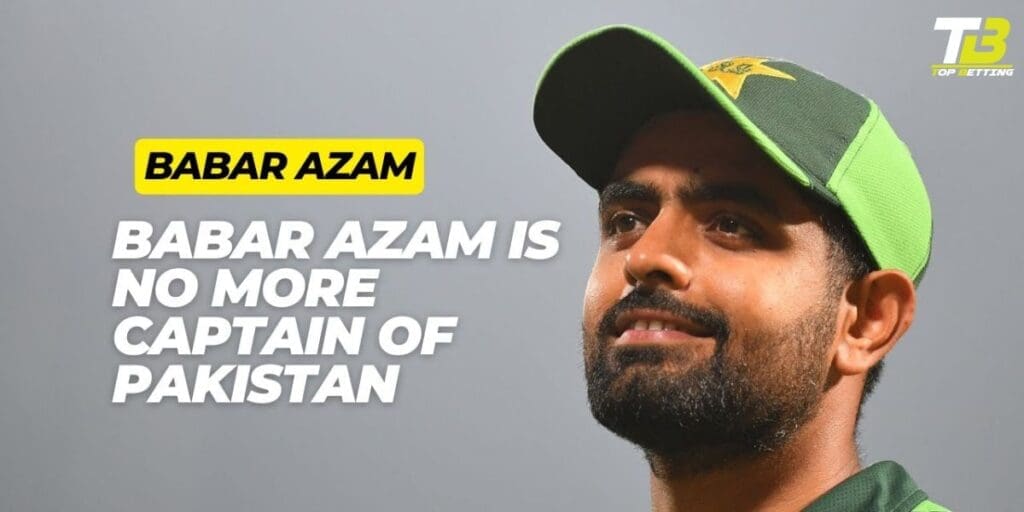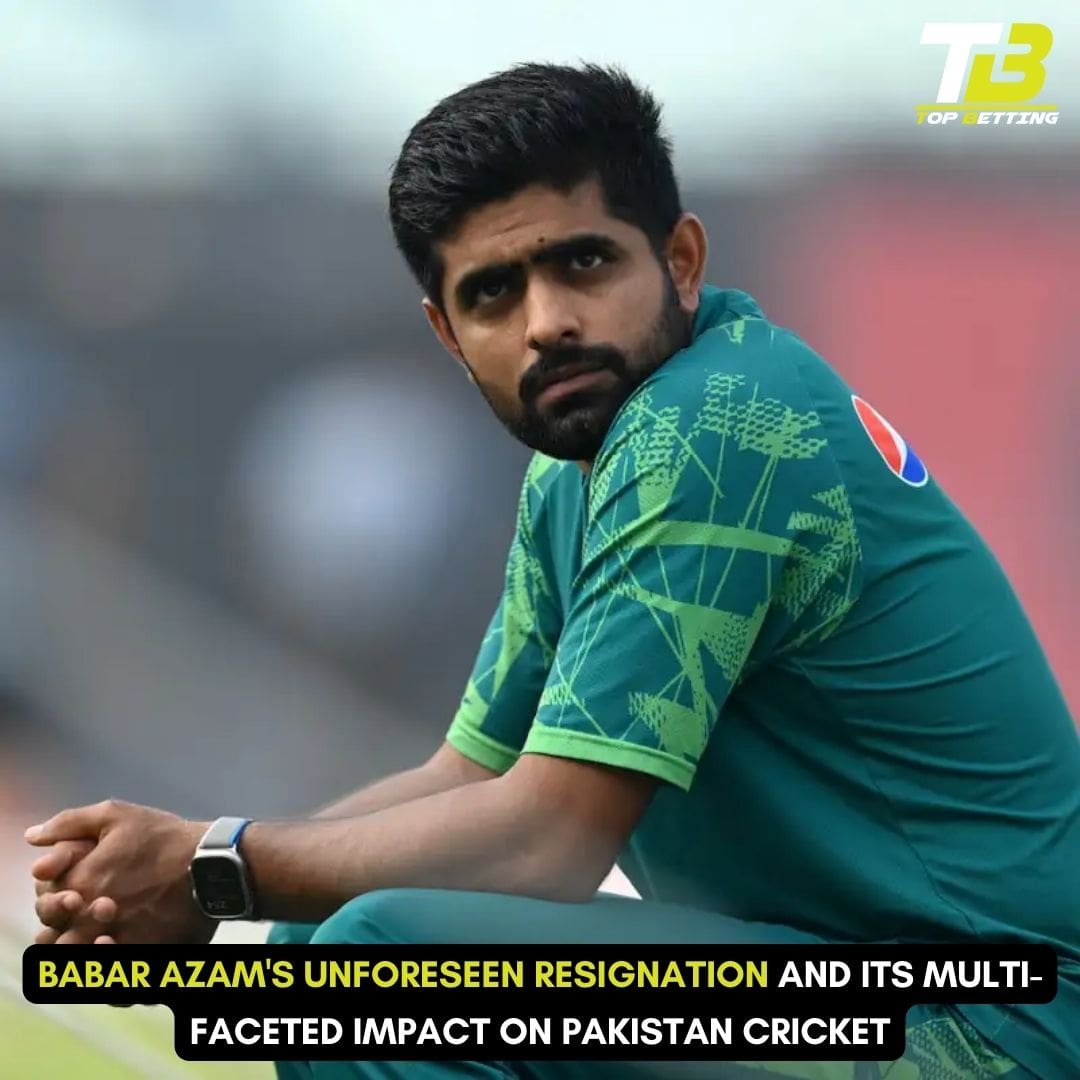

Babar Azam’s Unforeseen Resignation | A Multi-Faceted Impact
Unveiling the Dramatic Shift
In a cricketing narrative already accustomed to unexpected twists, the recent events at the PCB headquarters during a protracted meeting at the Gaddafi Stadium have raised eyebrows and ignited discussions. The linchpin of this upheaval was the unforeseen resignation of Babar Azam as the captain across all formats, setting off a chain reaction of changes that has left the cricketing fraternity in a state of speculation and contemplation. Let’s embark on a comprehensive exploration of the intricate details and unravel the potential implications for Pakistan cricket.
The Genesis: Why Did Babar Azam Resign?
The aftermath of subpar performances in the ODI World Cup often triggers a reassessment of leadership. Such was the case when Pakistan failed to reach the semi-finals in 2019, resulting in the departure of head coach Mickey Arthur and batting coach Grant Flower. Within a year, Sarfaraz Ahmed bid adieu to his role as ODI captain.
Babar Azam, heralded as the torchbearer of Pakistan’s rebuild, faced mounting pressure owing to lingering concerns about his decision-making prowess, especially in critical in-game situations. While his batting prowess is unquestionable, the team’s recent Test performances raised eyebrows. The disappointing results in the 2023 Asia Cup, coupled with a lackluster World Cup campaign, intensified scrutiny on Babar’s leadership.
Despite Babar expressing a commitment to lead Pakistan’s rebuild after the World Cup, the PCB’s decision to remove him as the white-ball captain left him with little choice but to resign across all formats. The reluctant nature of his departure adds a layer of complexity to the unfolding narrative.
Navigating the Legal Terrain: Can an Interim Committee Remove a Captain?
The PCB’s current interim management committee, spearheaded by Zaka Ashraf, finds itself in a precarious position. Despite the authority to appoint and remove captains resting with the PCB chairman, the committee’s temporary status limits its ability to make significant changes. A court ruling in Pakistan has emphasized that the committee operates solely on a caretaker basis and should refrain from making substantial decisions during its tenure.
The intricacies of the legal landscape forced the PCB to navigate carefully, ultimately leading to Babar Azam’s voluntary resignation. Refusing to step down would have potentially left the board without a clear mechanism to remove him, barring the unpalatable option of simply not selecting him.
The Dawn of New Leadership: Who Replaces Babar Azam, and in Which Formats?
The PCB appeared remarkably prepared for Babar’s resignation, swiftly announcing Shan Masood as the new Test captain. Simultaneously, Shaheen Afridi assumed the T20I captaincy. However, the ODI captaincy remains shrouded in mystery, with the PCB teasing an announcement “in due course.” The element of suspense adds an intriguing dimension to the restructuring of the team’s leadership.
Untangling the Coaching Conundrum: The Fate of Mickey Arthur and Grant Bradburn
The coaching staff, a crucial element in any cricket team’s success, found themselves in the eye of the storm. Team director Mickey Arthur and head coach Grant Bradburn had their roles “reassigned,” a euphemism that leaves their future roles in limbo. While no official details have emerged about their new assignments, it is confirmed that neither will accompany the team to Australia for the upcoming three-match Test series.
The lingering question arises: Why not remove them? The answer lies in the intricacies of the PCB’s current limitations. The committee, it seems, cannot unilaterally remove coaches without their resignations, a scenario not expected to unfold anytime soon.
The Hafeez Factor: A New Direction for Team Management
In the absence of Arthur and Bradburn, a significant development surfaced in the form of Mohammad Hafeez. Zaka Ashraf, in a meeting that included Mohammad Hafeez, extended an offer for Hafeez to take over as team director. This move adds a layer of intrigue to the team’s dynamics, with Hafeez set to travel with the side to Australia and New Zealand. However, the roles of head coach and chief selector for the upcoming tour remain vacant, with Younis Khan and Wahab Riaz emerging as potential frontrunners.
The Ongoing Administrative Quandary: When Will Decisions Hold Weight?
The extension of the caretaker government’s role, stretching beyond the constitutionally allotted three months, has injected prolonged uncertainty into PCB decisions. Zaka Ashraf, currently leading the management committee, received a three-month extension from the caretaker prime minister. This extension is expected to persist until February, aligning with general elections in Pakistan.


The Political Pendulum: A Glimpse Beyond February
As cricket enthusiasts eagerly await a semblance of stability, the fate of these recent changes is destined to be intertwined with the political landscape. If Najam Sethi returns as PCB chairman after the general elections in February, a plausible scenario, it could herald positive news for Arthur and Bradburn. Sethi, a proponent of hiring foreign coaches, could potentially shape the coaching staff according to his vision.
Prognosticating the Future: Temporary Changes for the Australia Tour?
The ripple effects of these changes are anticipated to be in effect for the imminent tour of Australia and the subsequent five T20Is in New Zealand. Beyond that, in the inherently unpredictable realm of Pakistan cricket, all bets are off. The cricketing fraternity will closely monitor team performances and administrative decisions in the coming months, as the sport in Pakistan navigates its way through a phase of uncertainty and transition.


